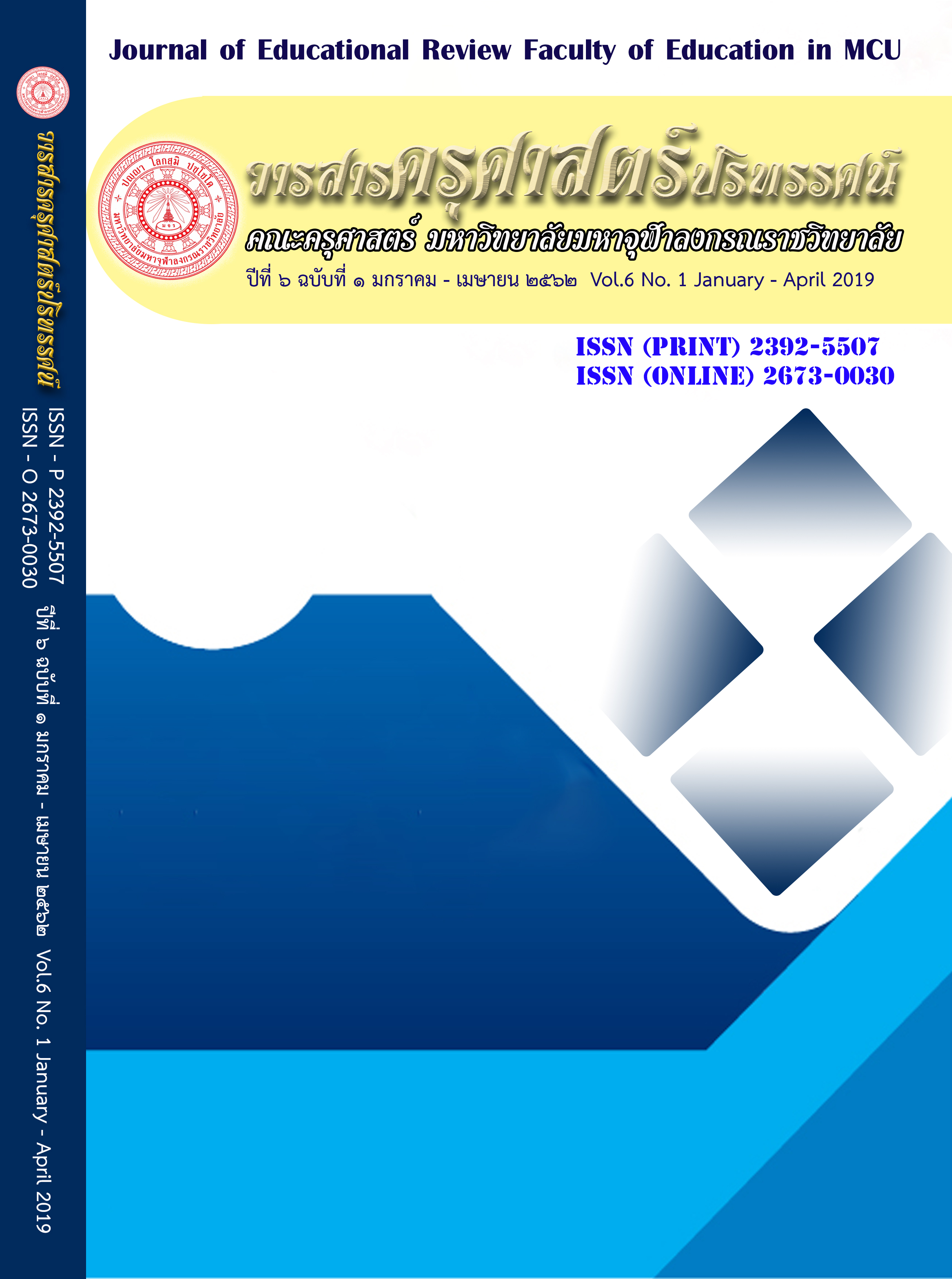A Study of Teaching and Learning Management Guidelines in Buddhist Subjects Based on the Four Noble Truths for Phrapariyattidhamma School, General Education Section, Group 3
Main Article Content
Abstract
The objectives of this research were; 1) to study the state of teaching and learning management in Buddhist subjects based on The Four Noble Truths of Phrapariyattidhamma School, General Education Section, Group 3, 2) to study guidelines of teaching and learning management in Buddhist subjects based on The Four Noble Truths of Phrapariyattidhamma School, General Education Section, Group 3, and 3) to propose guidelines of teaching and learning management in Buddhist subjects based on The Four Noble Truths of Phrapariyattidhamma School, General Education Section, Group 3. The mixed research methodology was used in the study. The quantitative data were collected 217 administrators and teachers of Phrapariyattidhamma School, General Education Section, Group 3 by questionnaires and analyzed by mean and standard deviation. The qualitative data were collected from 3 experts through in-depth interviews and analyzed by content analysis.
The results of the study found that:
The state of teaching and learning management in Buddhist subjects based on The Four Noble Truths of Phrapariyattidhamma School, General Education Section, Group 3, was at a high level overall. In each aspect, the problems were found in: 1) Curriculum; order and process of teaching and learning management, 2) Learning Process; practice and strengthening can change students’ behaviors, 3) Media; variety of media was used in teaching and learning process, 4) Learning Activity; activity during learning can create a good relationship among students, and 5) Measurement and Evaluation; Teachers need to clarify their own weaknesses to develop.
The guidelines of teaching and learning management in Buddhist subjects based on The Four Noble Truths of Phrapariyattidhamma School, General Education Section, Group 3, indicated that: 1) Curriculum; the curriculum was not related to students’ contexts (Dukkha), it should be adjusted to the need of students (Samudaya), how the curriculum can be adjusted to match students’ requirements (Nirodha), and to have cooperation in solving the problems (Magga), 2) Learning Process; learning can change students’ behaviors a little (Dukkha), teachers try to find out the cause of this problem (Samudaya), to variety of training programs (Nirodha), and to assign students with satisfying behaviors to lead the group (Magga), 3) Media; teachers and learners have limited skills in using media (Dukkha), teachers and learners lack of skills (Samudaya), to introduce teachers and learner to use media (Nirodha), and to train teachers and learners in using media (Magga), 4) Learning Activity; a little of knowledge and learning sharing (Dukkha), to know a little of knowledge and learning sharing (Samudaya), to acknowledge the advantage of knowledge and learning sharing (Norodha), and to promote knowledge and learning sharing Magga), and 5) Measurement and Evaluation; the learning assessment results were not revealed to the learners (Dukkha), to find problems of keeping the assessment results unrevealed (Samudaya), to find suitable ways to let learners to assess the performance results (Nirodha), and to hand the assessment results to the learners (Magga).
Article Details
ทัศนะและความคิดเห็นที่ปรากฏในบทความในวารสารฉบับนี้ถือเป็นความรับผิดชอบของผู้เขียนบทความนั้นเพียงผู้เดียว และไม่ถือเป็นทัศนะและความรับผิดชอบของกองบรรณาธิการ
กองบรรณาธิการขอสงวนสิทธิ์ในการคัดเลือกบทความลงตีพิมพ์และจะแจ้งให้เจ้าของบทความทราบหลังจากผู้ประเมินบทความตรวจอ่านบทความแล้ว
ต้นฉบับที่ได้รับการตีพิมพ์ในวารสารครุศาสตร์ปริทรรศน์ คณะครุศาสตร์ มหาวิทยาลัยมหาจุฬาลงกรณราชวิทยาลัย ถือเป็นกรรมสิทธิ์ของคณะครุศาสตร์ มหาวิทยาลัยมหาจุฬาลงกรณราชวิทยาลัย ห้ามนำข้อความทั้งหมดหรือบางส่วนไปพิมพ์ซ้ำ เว้นเสียแต่ว่าจะได้รับอนุญาตจากมหาวิทยาลัยฯ เป็นลายลักษณ์อักษร
References
กรมวิชาการ กระทรวงศึกษาธิการ. (๒๕๔๔). คู่มือการจัดกระบวนการเรียนรู้หน้าที่พลเมืองศีลธรรม ระดับมัธยมศึกษาตอนปลาย. กรุงเทพมหานคร : คุรุสาลาดพร้าว,
จรัล กาอินทร์. (๒๕๔๐). ปัญหาการเรียนการสอนวิชาพระพุทธศาสนา ในระดับมัธยมศึกษาตอนต้น อำเภอเมืองปาน จังหวัดลำปาง. การค้นคว้าแบบอิสระศึกษาศาสตรมหาบัณฑิต. บัณฑิตวิทยาลัย : มหาวิทยาลัยเชียงใหม่.
ทินพันธ์ นาคะตะ. (๒๕๔๓). พระพุทธศาสนากับสังคมไทย. กรุงเทพมหานคร : สหายบล็อกและการพิมพ์.
บุญเรียง ขจรศีลป์. (๒๕๓๐). วิจัยทางการศึกษา. กรุงเทพมหานคร : ฟิสิกส์เซ็นเตอร์.
ปรีชา ปริชาโน (แสงราม). (๒๕๕๓). การศึกษาปัญหาการเรียนการสอนวิชาพระพุทธศาสนาในสถานศึกษา : กรณีศึกษาโรงเรียนสตรีวัดระฆัง เขตบางกอกน้อย กรุงเทพมหานคร.วิทยานิพนธ์พุทธศาสตรมหาบัณฑิต. บัณฑิตวิทยาลัย : มหาวิทยาลัยมหาวิทยาลัยมหาจุฬาลงกรณราชวิทยาลัย.
พนิดา สินสุวรรณ, วีระวัฒน์ พูลทวี และอัญชลี เศรษฐเสถียร. (๒๕๓๒). สภาพการเรียนการสอนวิชาพระพุทธศาสนาตามหลักสูตรมัธยมศึกษาพุทธศักราช ๒๕๒๔ ของครูผู้สอนระดับมัธยมศึกษาตอนปลาย เขตการศึกษา ๘. วิทยานิพนธ์ศึกษาศาสตรมหาบัณฑิต (บัณฑิตวิทยาลัย : มหาวิทยาลัยเชียงใหม่.
วิไล ตั้งจิตสมคิด. (๒๕๓๔). การศึกษาและความเป็นครูไทย. กรุงเทพมหานคร : โอเอสพริ้นติ้งเฮ้าส์.
สภาสังคมสงเคราะห์แห่งประเทศไทย. (๒๕๔๒). การส่งเสริมศาสนาและพัฒนาจิตใจและการป้องกันแก้ไขปัญหายาเสพติด. เอกสารการประชุมเชิงปฏิบัติการ.
สุมน อมรวิวัฒน์. (๒๕๔๒). การพัฒนาการเรียนรู้ตามหลักพุทธศาสตร์ : ทักกระบวนการเผชิญสถานการณ์. กรุงเทพมหานคร :โรงพิมพ์สุโขทัยธรรมาธิราช.


